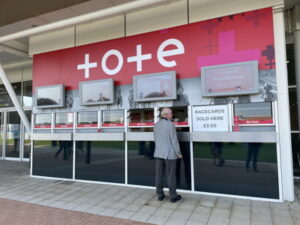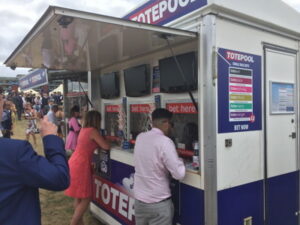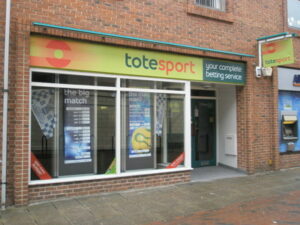 The Tote, also known as the Horserace Totalisator Board, played a significant role in the world of horse racing and betting for over a century. As a unique betting system, it offered an alternative to traditional bookmakers and provided a platform for punters to wager on horse racing events.
The Tote, also known as the Horserace Totalisator Board, played a significant role in the world of horse racing and betting for over a century. As a unique betting system, it offered an alternative to traditional bookmakers and provided a platform for punters to wager on horse racing events.
Established in 1928, it was the idea of Winston Churchill and was initially a government-appointed board that offered state-controlled betting as an alternative to the illegal off-course bookmakers that had begun popping up. It also worked to put some of its profits back into the sport of horse racing.
The first time that the Tote appeared on racecourses was on the second of July 1929, when both Carlisle Racecourse and the July Course at Newmarket boasted them. When the Betting Levy Act came into law in 1961, the Racehorse Betting Control Board was reconstituted to become the Horserace Totalisator Board, with the funds to racing moved to the Horserace Betting Levy Board.
The first high street shop was opened by the Tote in 1972 before growing over the years that followed. It was sold to Betfred in 2011 before being bought by the UK Tote Group in 2019.
The Birth Of The Tote
 The birth of the Tote, short for the Horserace Totalisator Board, marked a significant milestone in the history of horse race betting. The concept of pool betting, which formed the foundation of the Tote, originated from the desire to offer an alternative to traditional bookmakers.
The birth of the Tote, short for the Horserace Totalisator Board, marked a significant milestone in the history of horse race betting. The concept of pool betting, which formed the foundation of the Tote, originated from the desire to offer an alternative to traditional bookmakers.
It aimed to provide a fair and transparent betting system for punters. The idea of the Tote was inspired by George Julius, an Australian engineer who invented the totalisator machine in the early 20th century. The first implementation of this revolutionary system took place at Newmarket and Carlisle Racecourses in 1929.
Pool betting, as facilitated by the Tote, worked by pooling together all the bets placed on a race into a common pool. After deducting taxes and operating costs, the remaining pool was divided among the winning bettors based on the amount they wagered and the odds at the time of the race. This approach differed from the traditional bookmaker system, where odds were fixed at the time of placing the bet.
The Tote quickly gained popularity amongst punters, who welcomed the transparent and impartial nature of pool betting. Its expansion across various racecourses in the United Kingdom further solidified its position as a reputable betting institution.
Early Years and Expansion

During its early years, the Tote experienced a period of rapid growth and expansion, solidifying its position as a popular alternative to traditional bookmakers. Punters embraced the concept of pool betting, which offered them a unique and exciting way to engage with horse racing events.
As the Tote gained traction, it extended its presence across various racecourses throughout the United Kingdom. Its increasing availability allowed a wider range of bettors to participate in this novel form of wagering. The simplicity and transparency of the Tote’s system appealed to both seasoned gamblers and casual punters, helping it gain popularity.
Public reception of the Tote was overwhelmingly positive. Punters appreciated the competitive odds and the sense of community that pool betting fostered. The Tote became an integral part of the horse racing experience, with racegoers eagerly placing their bets in anticipation of the race outcomes.
The government’s involvement in overseeing and regulating the Tote played a crucial role in its expansion. Strict regulations were put in place to ensure the fairness and integrity of the betting system. The government’s oversight provided punters with the confidence that their wagers were being handled in a secure and regulated environment.
The Tote in Its Prime
 During its prime, the Tote reached the zenith of its influence and popularity within the horse racing and betting industry. It underwent significant advancements and innovations that cemented its position as a cornerstone of fair and transparent betting practices.
During its prime, the Tote reached the zenith of its influence and popularity within the horse racing and betting industry. It underwent significant advancements and innovations that cemented its position as a cornerstone of fair and transparent betting practices.
One notable aspect of the Tote was the introduction of innovative technologies. Mechanical and, later, electronic totalisator machines revolutionised the betting process, enabling more efficient and accurate calculation of bets. These advancements enhanced the overall betting experience for punters, facilitating quicker payouts and reducing the potential for errors.
Not only that, but the Tote also played a crucial role in the financial sustenance of the horse racing industry. A portion of the Tote’s revenue was funnelled back into the sport, supporting racecourses, breeding programs and prize money. This contribution had a profound impact on the sustainability and growth of the industry, ensuring its continued development.
The Tote also had a significant social impact. It provided employment opportunities, ranging from tote operators to administrative staff, further boosting local economies. The Tote became synonymous with national heritage, as its presence at racecourses became an iconic symbol of horse racing culture and tradition.
Challenges & Transformation

The Tote has faced its fair share of challenges and undergone significant transformations throughout its history. One of the primary challenges has been adapting to evolving regulatory changes. Shifting regulations surrounding gambling and betting have posed hurdles for the Tote, requiring it to continuously adjust its operations to comply with new laws and guidelines. This has included changes in taxation, the introduction of licensing requirements and the need to adhere to responsible gambling practices.
Another significant transformation occurred when there were attempts to privatise the Tote. Privatisation brought about changes in ownership and management structures, leading to debates about the Tote’s future direction.
Controversies surrounded the privatisation process, with concerns raised about potential impacts on the Tote’s mission and relationship with the horse racing industry. On top of that, the emergence of online betting platforms and the rise of betting exchanges presented additional challenges.
The Tote had to navigate the changing landscape and find ways to compete with these new forms of gambling that offered increased convenience and choice for punters. In response to these challenges, the Tote has undergone transformational strategies to remain relevant and viable.
It has explored collaborations and partnerships with other industry stakeholders to enhance its offerings and reach a wider audience. In addition, the Tote has embraced technology, developing online platforms and mobile applications to meet the changing preferences of bettors. The challenges faced by the Tote have necessitated transformation and adaptability. By navigating these hurdles and embracing innovation, the Tote has demonstrated its resilience and commitment to staying at the forefront of the betting industry.
Sale & Change Of Ownership
 In 2011, the Tote was acquired by Betfred, in spite of other offers being on the table and there being concern from the horse racing industry. The fear of many was that Fred Done, the owner of Betfred, only wanted to buy the Tote in order to get hold of the many shops that it boasted around the country.
In 2011, the Tote was acquired by Betfred, in spite of other offers being on the table and there being concern from the horse racing industry. The fear of many was that Fred Done, the owner of Betfred, only wanted to buy the Tote in order to get hold of the many shops that it boasted around the country.
The acquisition not only brought about a shift in ownership and management for the Tote, but it also introduced a private entity into the Tote’s structure who had different aims and objectives than the Tote did when it was first set up. As a result, the Tote underwent significant changes in its operations and strategy.
The new ownership aimed to leverage their expertise and resources to drive growth and enhance the Tote’s offerings. They introduced new technologies, revamped marketing campaigns and expanded the Tote’s reach through online platforms and mobile betting applications in much the same way that Betfred had done. The change of ownership also brought opportunities for collaboration and synergy.
The Tote could tap into Betfred’s extensive network and customer base, enabling it to explore new markets and attract a broader audience. Whilst the sale and change of ownership signalled a shift in the Tote’s direction, the ultimate impact and long-term implications remain to be seen.
The Legacy & Current State Of The Tote
 The Tote’s legacy as a pioneering institution in the world of horse race betting remains ingrained in the annals of gambling history. Its introduction of pool betting revolutionised the way betting worked, offering punters an alternative to traditional bookmakers.
The Tote’s legacy as a pioneering institution in the world of horse race betting remains ingrained in the annals of gambling history. Its introduction of pool betting revolutionised the way betting worked, offering punters an alternative to traditional bookmakers.
The Tote’s contribution to horse racing funding and its status as a symbol of national heritage have left an indelible mark. However, the current state of the Tote is marked by both challenges and opportunities. The rise of online bookmakers and betting exchanges has presented stiff competition, challenging the Tote’s market position.
To remain relevant, the Tote has had to adapt and innovate. It has embraced digital transformation by developing online platforms and mobile apps, expanding its reach and catering to the preferences of modern bettors. Collaborations and partnerships have become crucial for the Tote’s growth.
By forging alliances with other industry stakeholders, such as racecourses and horse racing organisations, the Tote has sought to enhance its offerings and expand its customer base. The Tote’s future prospects hinge on its ability to balance tradition and innovation. While preserving its legacy, it must also embrace new technologies and betting trends.
The decision of the group of racehorse owners and breeders to come together in order to create the UK Tote Group and buy the Tote from Betfred was done with the future of the industry in mind. They are ‘united by a shared desire to secure British racing’s finance for generations to come’, with the hope being that a revitalised Tote will allow for that to happen.
As A.P. McCoy put it, “A successful Tote means big prize pots for race fans and money going back into the sport.” It looks as if the organisation is in good hands for now, but whether that remains the case long-term is yet to be known.
